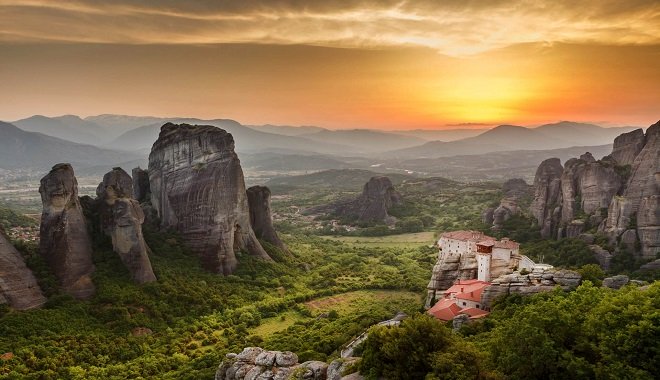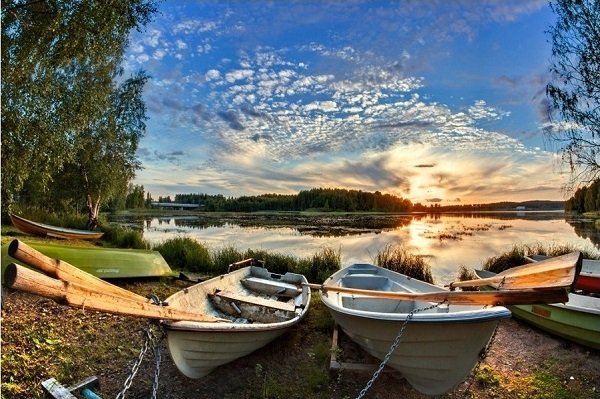The Beauty of Nature as a Stimulus for Spiritual Enquiry
12 August 2020The way of life in large cities has degenerated in recent years. Pollution of the atmosphere, accumulation of garbage, electromagnetic and noise pollution, lack of greenery, the ecological crisis, the commute between home and places of work, traffic congestion as well as the alienation and isolation of people, despite the flourishing social networks, have all contributed to the heavy atmosphere. Permanent residents have left city centers and are seeking a clear glade where they can breathe. This is apparent from the unheard of construction activity in the areas surrounding these large cities, as well as the crowds at ports and airports at holiday times.
Yet these attempts to escape don’t always guarantee the longed for spiritual rest and inner peace. Holidays without spiritual awareness and nourishment by grace leave a huge inner void which usually can’t be filled, despite desperate efforts to do so. Questions arise such as: can people be refreshed not only bodily but also spiritually by taking a holiday? Does the frantic pace of life contribute to the fact that we miss opportunities that could be a source of inspiration and spiritual improvement? Can contact with nature be of assistance in this direction?

People are linked directly to the natural environment not only for nourishment and maintenance of life but also to create civilization. The Ionian philosophers claimed that there were four elements in nature: ‘everlasting fire’, air, water and earth. According to Heraclitus, conflict between these elements results in a continuous recycling and ‘most beautiful harmony’. To this quartet, Aristotle added a fifth, the ether, which was established as quintessence. It was believed that this element was to be found in the upper reaches of the heavens and was unbegotten, imperishable, ageless, everlasting and unalterable. Through their vision and insight the philosophers reached high levels in their quest and, in a way prepared the world for acceptance of the Christian revelation.
The beauty of the creation can contribute to spiritual enrichment. Of course, much depends on how we view nature: as casual and idle visitors or a sensitive inquirers? In Church hymnography, for example, the beauty of nature is described in a poetic and vivid manner and is associated with the quality of life. The natural environment exists for our sake and leads to the Creator: ‘The heavens tell the glory of God and the firmament declares the work of His hands’ (Ps. 18, 1). The Nobel -prize winning poet Odysseas Elytis talks of the ‘Maker of the clouds and waves Who sleeps among us’ (Axion Esti, The Passions, Reading 2, 6).
But for an ascent to be made from the tangible beauty of creation to the Creator and Maker of all things, in order for people made ‘in the image of God’ to become aware, certain spiritual senses need to be exercised. Internal purification of the excess weight and the fog of the corrosive passions. In this way, material creation, which is an expression of the providential action of God towards His most perfect creation, can become a source of inspiration.
Hymnographers who have a pure heart associate the beauty of the creation with the effulgence of the Creator. As lovers of God’s beauty, the sacred poets introduce us to the mystical path of knowledge of God. The beauty and harmony of created things, though they are not to be compered to divine brilliance, contribute to the cleansing of the senses and draw us towards our most-merciful God. The coloring of plants, the natural alternations between mountains and plains, the shapes of rivers and lakes, the riches of the forests, the sea, the sun the stars, with the harmony of their motion, even a drop of water on a flower, the rustle of the wind through trees, a ray of sunlight in deep darkness, or a gentle breeze in the summer heat can all lead to a hymn of grateful praise to the Creator.
The month of August, in particular, is thought of as a time of rest, holidays and summer lazing. For the Orthodox, however, it’s also a month of spiritual enquiry, supplicatory canons to the Lady of the Angels, and the great feasts of the Transfiguration and the Dormition of the Mother of God. And when rest for the body is combined with spiritual nourishment and the proper appreciation of the beauty of creation, this is a genuine blessing for us. Holidays can easily become opportunities for visits to religious sites, for unique emotional experiences, and opportunities to get in touch with our Christian cultural tradition. In this way, people who are stressed and anxious can begin to acquire a ‘delicate and poetic soul’ as Saint Porfyrios so aptly put it.

The saint continues: ‘Put beautiful moments to use. These incline the soul towards prayer. They make it refined, noble and poetic. Wake up in the morning and watch the royal sun emerge in a purple glow from the sea. If some view enchants you, a chapel, something beautiful, don’t dwell on that alone but go further, go on to praise the only beautiful One for all the beautiful things. Everything’s holy: the sea, swimming, the food. Enjoy them. They all enrich us, they all bring us to the great Love, they all lead us to Christ…Nature is the Gospel’s secret!’. But if we’re to view the beauty of nature in this way, we need faith at least a great as a grain of mustard and also spiritual exercise of the senses.
In The Little Mariner, Odysseas Elytis notes: ‘When we discover the mystical relationships between notions and we walk further into the depths, we’ll come out into another kind of clearing, which is Poetry. And poetry is always one, as the sky is. The question is, where you see the sky from’. Poetry, and particularly Church poetry, is a glade where we can give ear to the mystical utterances of the Spirit and see the world surrounding us in a terms of praise, gratitude and elevation, so that we may be taken up into the beauty of the Creator’s beauty. It calls upon us to see the natural environment not so much from the point of view of profit, of unreasoning exploitation, of hyper-consumption of material goods, but more from the aspect of self-criticism, of repentance and spiritual enquiry. Then we’ll respect it, protect it and discover through the beauty of nature the cohesive and providential action of the Creator, Who ‘made everything in wisdom’.






